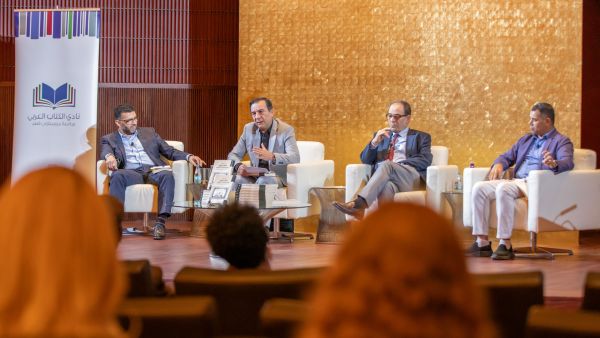Arabic Language Ideology Shapes Policy, Says Scholar at GU-Q Talks

In a thought-provoking series of talks at Georgetown University in Qatar (GU-Q), Dr. Yasir Suleiman CBE, Emeritus Professor of Modern Arabic Studies at the University of Cambridge, addressed the way that Arabic language is taught and used for political purposes.
Rethinking Arabic Grammar Education
During a public event held in English, Dr. Suleiman first explored the politics of Arabic language education, particularly the traditional emphasis on form over meaning in teaching Arabic grammar, describing it as “a defining feature.”
“Arabic language ideology is characterized by an ethical stance, according to which, deviating from grammatical rules is tantamount to deviating from the truth,” said Dr. Suleiman, shedding light on the deep-seated beliefs that influence language teaching and policy.
Drawing from his expertise as a consultant on Qatar’s education reform initiative, Education for a New Era, Dr. Suleiman shared how these beliefs shape language policy. He advocated for a modern pedagogy that emphasizes practical application and contextual learning over rote memorization, insights that could inspire educational reforms and discussions across different regional frameworks.
Misinterpretation of Arabic for Political Aims
At a discussion in Arabic hosted by GU-Q’s Arabic Book Club, Dr. Suleiman continued to share his expertise, this time discussing how Arabic terms are misinterpreted for political aims. The event, moderated by GU-Q Associate Professor of Arabic Dr. Yehia Mohamed, included a panel discussion with professors Khaled Al Hroub, Northwestern Qatar, Muntasir Al Hamad, Qatar University, and Emad Abdullatif, Qatar University. They explored the themes of linguistic ideology and the deliberate misinterpretation of Arabic terms to fuel anti-Arab and Islamophobic sentiment in America, as discussed in Dr. Suleiman's book, The Arabic Language in the Fray: A Study in Ideology, Anxiety and Terrorism.
Dr. Suleiman painted a vivid picture of "the racism faced by Arabic speakers in their new environment." He argued that proponents of this bias manipulate the Arabic language “to justify animosity toward others and associate them with terrorism.”
About Dr. Suleiman
Dr. Suleiman, who chairs both the Advisory Board of the Centre for the Advanced Study of the Arab World and the Board of Trustees of the International Prize for Arabic Fiction, has dedicated his research to understanding how Arabic grammar is organized, how it is tested, and the resistance towards its alteration. His publications, such as “The 2018 Language Ideological Debate in Morocco,” address the Arabic language’s role in the social world, largely concerning issues of identity and conflict.
For more information on Georgetown Qatar’s faculty and student news, please visit the website at https://www.qatar.georgetown.edu/news/.
Background Information
Georgetown University in Qatar
Established in 1789 in Washington, DC, Georgetown University is one of the world’s leading academic and research institutions. Georgetown University in Qatar (GU-Q), founded in 2005 in partnership with Qatar Foundation, seeks to build upon the world-class reputation of the university through education, research, and service. Inspired by the university’s mission of promoting intellectual, ethical, and spiritual understanding, GU-Q aims to advance knowledge and provide students and the community with a holistic educational experience that produces global citizens committed to the service of humankind.
Located in Doha’s Education City, GU-Q offers the same internationally recognized Bachelor of Science in Foreign Service degree as Georgetown’s Capitol Campus in Washington, DC. This unique, interdisciplinary program prepares students to tackle the most important and pressing global issues by helping them develop critical thinking, analytic, and communication skills within an international context. GU-Q alumni work in leading local and international organizations across industries ranging from finance to energy, education, and media. The Qatar campus also serves as a residency and delivery location for the Executive Master’s in Emergency and Disaster Management along with the Executive Master’s in Leadership.
Georgetown University in Qatar
Established in 1789 in Washington, DC, Georgetown University is one of the world’s leading academic and research institutions. Georgetown University in Qatar (GU-Q), founded in 2005 in partnership with Qatar Foundation, seeks to build upon the world-class reputation of the university through education, research, and service. Inspired by the university’s mission of promoting intellectual, ethical, and spiritual understanding, GU-Q aims to advance knowledge and provide students and the community with a holistic educational experience that produces global citizens committed to the service of humankind.
Located in Doha’s Education City, GU-Q offers the same internationally recognized Bachelor of Science in Foreign Service degree as Georgetown’s Capitol Campus in Washington, DC. This unique, interdisciplinary program prepares students to tackle the most important and pressing global issues by helping them develop critical thinking, analytic, and communication skills within an international context. GU-Q alumni work in leading local and international organizations across industries ranging from finance to energy, education, and media. The Qatar campus also serves as a residency and delivery location for the Executive Master’s in Emergency and Disaster Management along with the Executive Master’s in Leadership.






